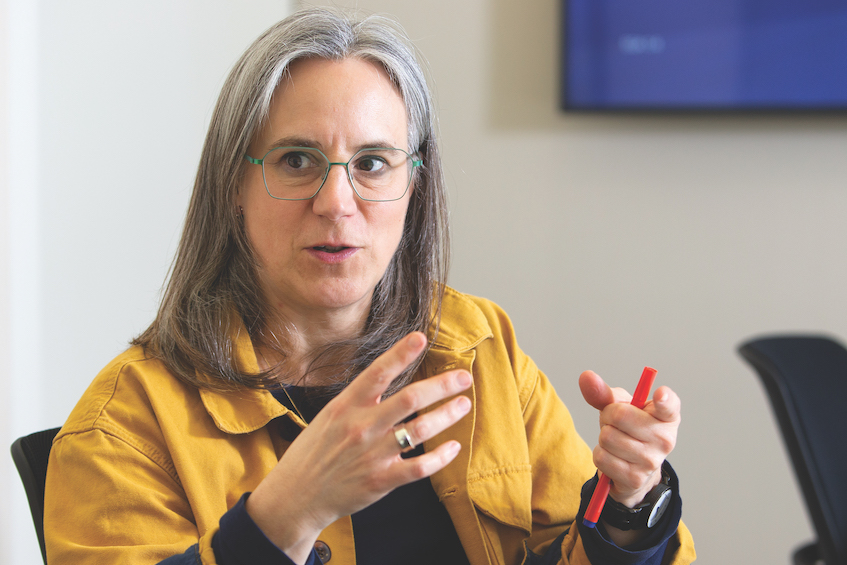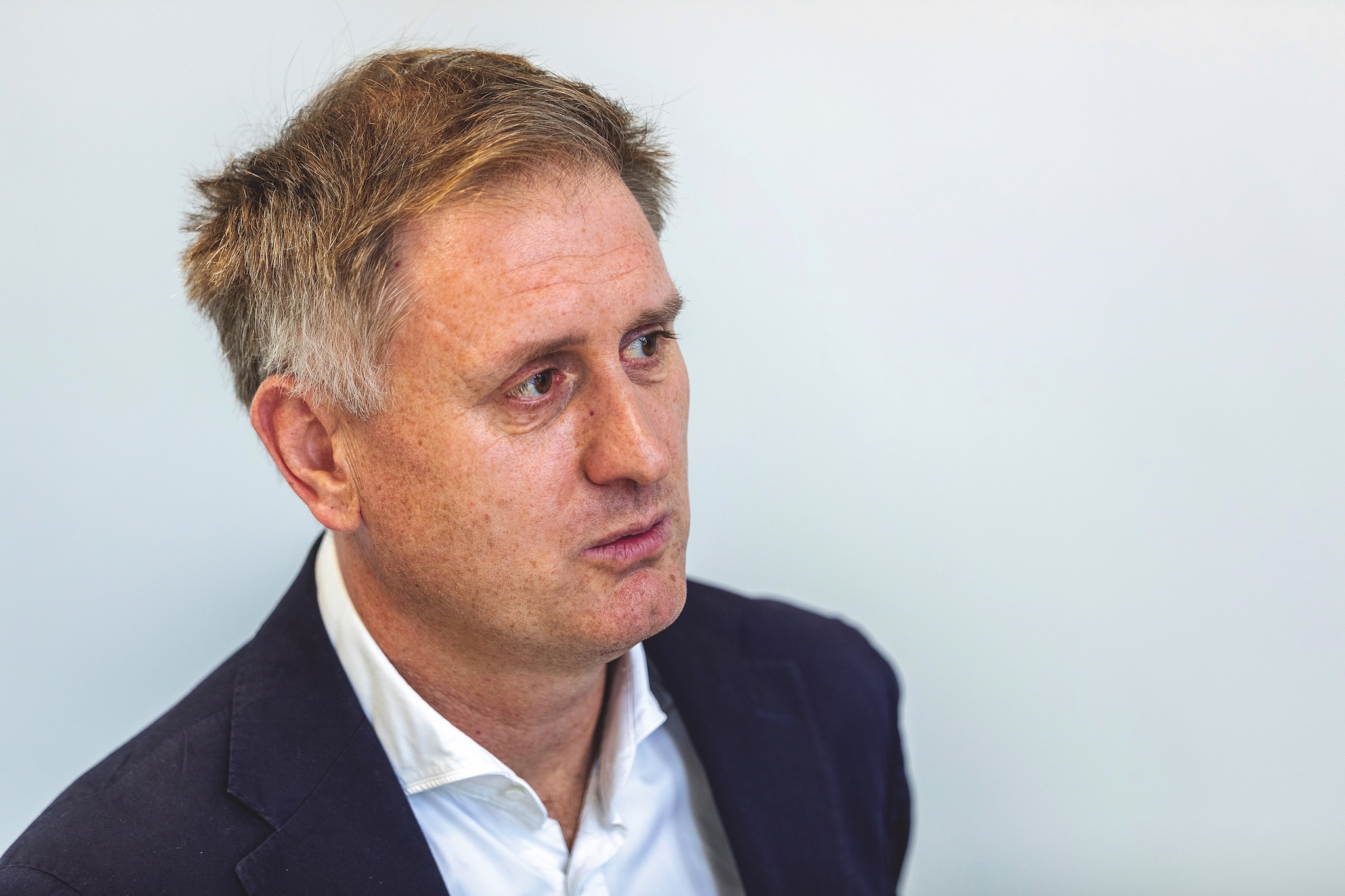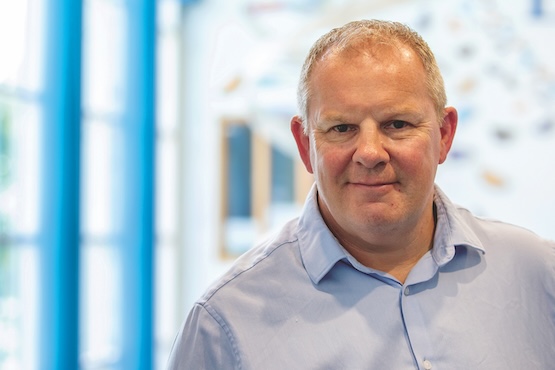“This strike has shifted attitudes — inside government and among NHS staff”

“The government miscalculated on all sorts of fronts”, says Sara Gorton, UNISON’s lead negotiator during the recent NHS strikes. She tells us how a tide of dissatisfaction from workers and strong public support enabled union negotiators to hold their nerve and cut a deal that won overwhelming backing from members.
“On 20 December, the day before our first strike action, the government started some really heavy scaremongering about the risk that patients were going to be placed under. There were warnings not to phone an ambulance,” Sara Gorton says – and for the first and only time during our interview, there’s a flash of real anger.
You need a cool head to run UNISON’s health operations and co-chair the NHS Staff Council through the NHS’s largest ever strikes, but Gorton felt the injustice of the accusation keenly. “We’d worked so hard to make sure there was proper emergency cover. The lay members who led the action in their workplaces really care about the services they deliver,” she says. “Trade unions have had our reputations damaged by the government.”
Meanwhile, ministers were refusing point blank to open talks on resolving the dispute. “They just ignored us; fobbed us off,” Gorton recalls – condemning the public to “a series of unnecessary strikes: it took four successive days of strike action from 999 staff” before the government agreed to discuss pay. Throughout the strikes, she adds, “they treated us, a Labour-affiliated trade union, as the enemy. And I think they found, to their peril, they had miscalculated on all sorts of fronts about that.”
It looks that way; for UNISON was ultimately key to the deal that ended industrial action by most unions, while the Royal College of Nursing (RCN) – a non-TUC union handled more sympathetically by ministers – remains locked in combat with the government, instructed by its members to fight on.
‘People wanted to get the balance back’
The story of the strikes is a fascinating one, narrated by one of its major players: Gorton succeeded UNISON general secretary Christina McAnea as head of health in 2017, having spent 15 years at the union in health policy and negotiating roles. “I rocked up on my first day, and thought: ‘Hmm, I’ve found somewhere that I really like’,” she remembers with a smile.
Back in July 2022, the government accepted the NHS Pay Review Body’s (PRB’s) recommendation for a flat-rate £1,400 pay rise for most Agenda for Change staff – a substantial real-terms pay cut for all but the lowest-paid. Ministers apparently hoped unions wouldn’t secure the strike mandates or public support required for industrial action, but they had misjudged the mood.
“A range of issues all came to a head at the same point,” comments Gorton. “We were surfing a tide of dissatisfaction from workers.” Tired of “the cost of living crisis, the mismanagement of the public sector, the bearing down of austerity,” people wanted to “get the balance back, in working people’s rights and conditions and rewards”.
What’s more, “the pandemic had reminded people why public service is important”; and since then, the NHS crisis has touched millions of people’s lives. “Everybody who’s had any contact with the NHS over the last year has witnessed for themselves what it’s like, phoning for an ambulance or sitting in A&E and waiting all night for attention,” says Gorton. “I think that’s one of the reasons why we got so much support.”
UNISON duly secured strike mandates at five ambulance trusts, and – with other health unions – went to government with a “retention package”. This package recognised that “pay was going to be significant, but it wouldn’t be the silver bullet” in resolving the dispute: staff were equally motivated by “the frustrations of working for so long with dwindling resources, with fewer and fewer colleagues to rely on, and under increasing amounts of pressure.” So unions sought an inflation-matching pay rise, along with action to ensure that “people are on the right band for the work that they do; that they’re paid for overtime; that they’re not being overworked; and that training, development and progression are improved”.
But the NHS Staff Council couldn’t agree a common position. By July 2022, Gorton recalls, “it was obvious that the RCN wasn’t going to wait for anybody else, so the prospect of joint action was never really on the cards.” On December 15, the RCN led with the first stoppage – demanding that government raise its offer to inflation plus 5%.
UNISON held its own first strike six days later. Designed with employers to protect patients, this was “limited both in the hours it covered, and the types of workers called,” notes Gorton: members wanted to show the public that they weren’t being put at risk and to able to escalate over time. “The way they organised it within their workplaces and delivered it maintained both public support and the commitment of those taking action,” she adds.
Ministers didn’t listen
 “Rishi Sunak just didn’t want to know…They didn’t listen to their own commentators; they didn’t listen to their own party members; and they didn’t listen to the public.”
“Rishi Sunak just didn’t want to know…They didn’t listen to their own commentators; they didn’t listen to their own party members; and they didn’t listen to the public.”
The government, however, had always insisted that pay was a matter for the PRB. Boris Johnson and his health secretary Sajid Javid “were beset with their own internal distractions,” recalls Gorton. “And when [Rishi] Sunak got in, he just didn’t want to know. He wanted to get on with his own agenda, and we weren’t on it.” Health secretary Steve Barclay appeared determined to hold the line.
As the strikes continued, this position became increasingly unsustainable. Through the winter, “political pundits always identified the NHS strikes as the dispute that was most likely to be settled,” notes Gorton. Meanwhile, public sympathy for the unions remained strong – bolstered, she believes, by the government’s obdurate refusal to discuss pay. Ministers “didn’t listen to their own commentators; they didn’t listen to their own party members; and they didn’t listen to the public,” she says.
“For a good three months, it felt like nothing was happening,” Gorton recalls – then the RCN were invited into the health department for private talks. That was Sunak’s work, she says: “The talks were led through the Department of Health, but they were engineered via Number 10.”
UNISON could have taken the same road. “It would have been the government’s strong preference for me to go in for UNISON on my own, and for us to have separate talks so that they could have played one union off against the other,” she says. “But you can either play that game, or you can push back and say: ‘We’re not going to be used in that way’.” UNISON leaders were determined that “if there was going to be a resolution, it would be through the proper structures, and with employers as well as unions.”
So they steered clear; and as it turned out, the RCN couldn’t reach agreement with Barclay. On 22 February UNISON announced that ballots had produced new strike mandates at four ambulance services and five trusts: the next strikes would cover NHS Blood and Transplant, and every ambulance provider bar one. “That created an understanding that if [ministers] didn’t do something to resolve this, it was just going to build,” comments Gorton. “The penny finally dropped.” A few days later, alongside other union representatives, Gorton was facing Steve Barclay in formal negotiations.
Cutting a deal
Those talks were like none she’d ever experienced. On every previous occasion, “NHS Employers would be given a mandate to negotiate with us, and we’d all go away somewhere, come back after a few days with a package, and then we’d have the horse trading over the funding.” Not this time: Barclay took a leading role himself, and Treasury officials were closely involved alongside employers.
On 16 March, the teams emerged blinking into the daylight. Unions had secured an additional 2% and a ‘backlog bonus’ for 2022-23; a 5% rise for 2023-24 (10.4% for Band 1 and 2 entry points); and a series of non-pay measures, addressing many of the issues covered in the unions’ retention package. UNISON members emphatically approved the deal in the subsequent ballot, as did the NHS Staff Council. “We got a very, very clear response,” says Gorton. “Our members are used to the process of being consulted about pay and industrial issues, and they knew when the time was right to cut a deal.
“Organisations with less experience and less of a history of industrial disputes may not have that institutional memory, so it doesn’t surprise me that it is a more difficult conversation inside other unions,” she adds. RCN members rejected the offer, which falls far short of the goals set by its leaders. The RCN is now seeking a fresh strike mandate, in a poll closing on 23 June.
Gorton points out that those 10.4% rises for the lowest paid simply raise pay salaries to the living wage. UNISON would have preferred rises targeted at a much wider swathe of lower-paid staff – and MiP members, she believes, also want to see a more progressive settlement. “They care about the ability of their organisations to recruit and retain people on low pay,” she says. “If we hadn’t had strong support from employers, and from senior managers on the professional side, then it would’ve been difficult to get support for that living wage boost at the bottom.”
Nonetheless, she recognises that many MiP members would not support UNISON’s preference for flat cash increases. “We’re going to have to find more sophisticated ways of setting flat rate and fairer pay approaches, so that people do not feel disenfranchised and opposed to them,” she comments. “This is a pay policy debate that we are going to want to engage MiP members in.”
In other fields too, the views of MiP members helped shape UNISON’s position: Gorton pushed hard to “remove the disincentives to take on the 8A-and-above management roles,” including the loss of overtime, annual increments and unsocial hours payments above Band 7. Ministers proved immovable on this occasion, she adds, but these goals “will come back to the shopping list next time we’re putting the claim together.”
UNISON is now pushing forward with the deal’s non-pay provisions, including a review of the PRB process – “a really big and important piece of work”, Gorton says – and reforms to apprenticeship pay and career development. “That’s a door ajar to talk about banding and the focus we need to bring to supporting people, not just into jobs in the NHS, but between different jobs and to progress in their roles,” she explains.
Asked what she’d like to see in the long-promised NHS workforce plan, Gorton notes that line managers are “deliverers of organisational culture; of interventions that are critical to the workforce.” In line with the Messenger Review, “we want management to be recognised as a separate skill, and not just added to people’s roles.”
UNISON also wants to improve career pathways and ensure that employers respect NHS-wide terms and conditions. Currently, she complains, officials and ministers “don’t police the system to make sure that employers are doing their job and delivering every bit of what the government is paying them for.”
A breakthrough
Looking ahead, Gorton believes that the strike has shifted attitudes, both inside government, and among NHS employees. Conservative ministers, she says, had “a culture of just ignoring the trade unions”. UNISON’s warnings of rising staff anger went unheeded; and as the strikes got underway, ministers tried first to stonewall, then to divide and rule.
Next time we tell them that “we’ve got a powder keg building, and that we can see a dispute brewing”, she says, ”I hope they take the opportunity to sit down with us. We saw a level of willingness to engage during the talks; that was certainly a breakthrough. And the proof of that will be in how things develop as the year rolls on.”
Meanwhile, the new pay deal has demonstrated “that trade unions can deliver for their members,” says Gorton. “It’s a solid example of how trade unions make a difference to people’s daily lives, delivering not only for the service – showing that we can invest more in the workforce – but also for individual members.
“Trade unions will be less easy to ignore in future,” she concludes. “I think that will be the legacy of this dispute.”
Related News
-

“Showing kindness and trust creates a virtuous circle – people respond well to that”
As chief executive of Suffolk and North East Essex, one of England’s most highly rated integrated care boards, Ed Garratt has pioneered a radically different approach to leadership – one based around kindness, trust and putting down deep roots in local communities. He talks to Healthcare Manager’s Matt Ross.
-

We need to give managers reasons to join the profession — not risks to avoid
Steve McManus’s work developing the leaders and managers the NHS needs for the 21st century has caught the eye of national leaders. The Royal Berkshire trust chief executive talks to Matt Ross about transforming services, developing leaders and the right way to regulate the management profession.
-

Interview: Dr Phil Hammond, doctor, comedian, health campaigner
Doctor, comedian, broadcaster, writer, health campaigner and politician manqué, Dr Phil Hammond is now drawing up a manifesto to rescue the NHS and boost the nation’s health. On the eve of a watershed general election for the UK, he spoke to Healthcare Manager’s Matt Ross.